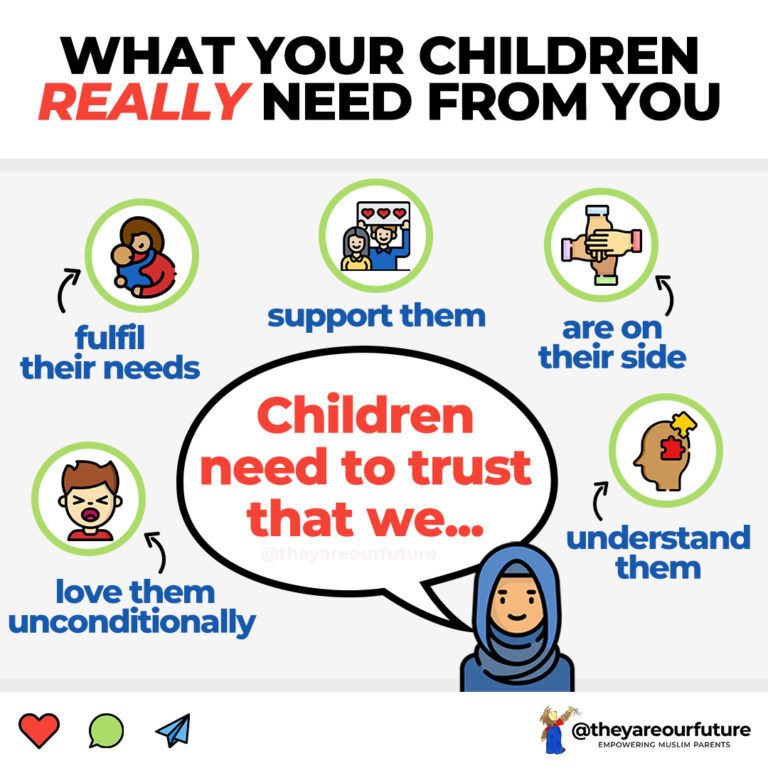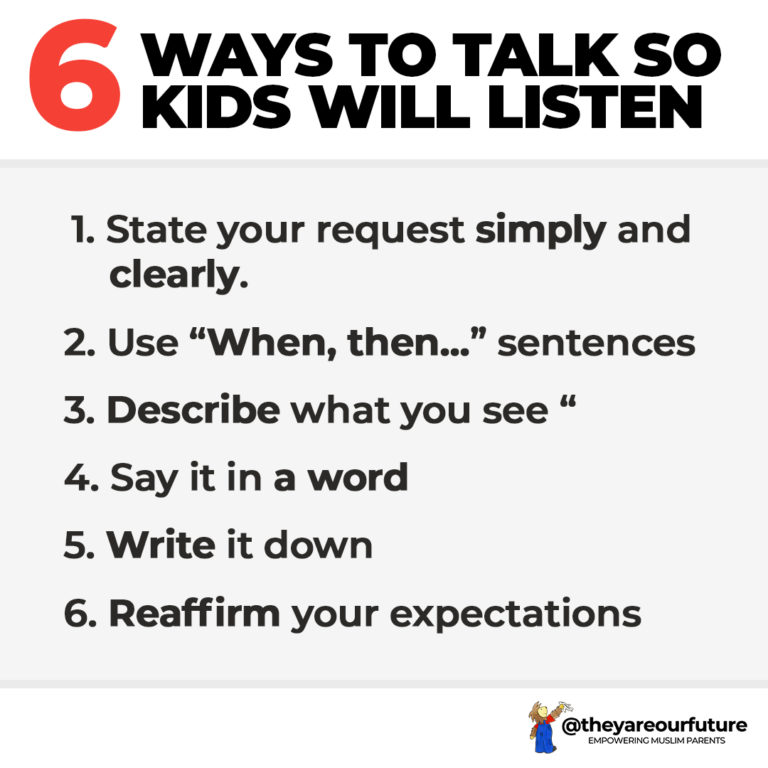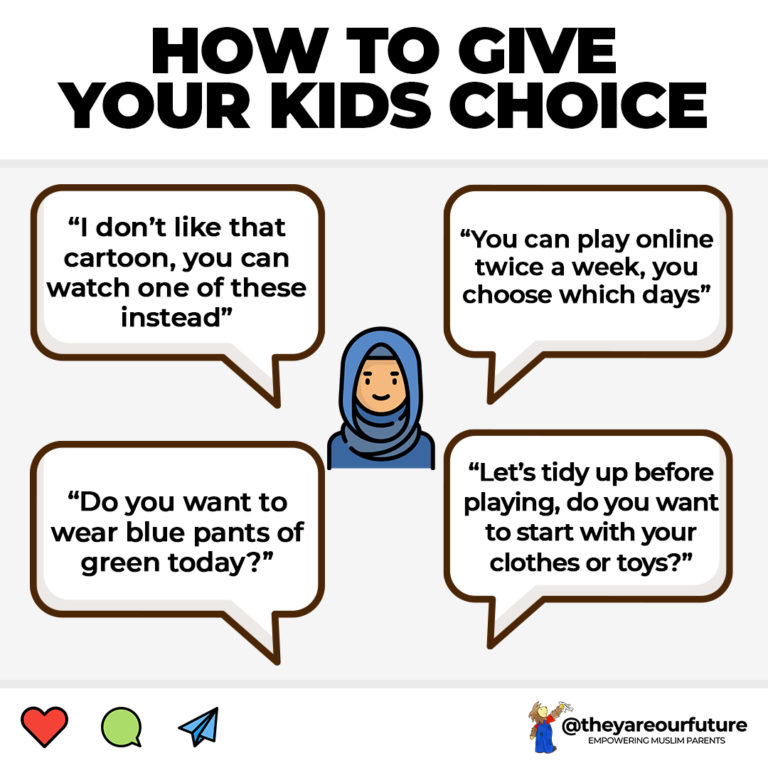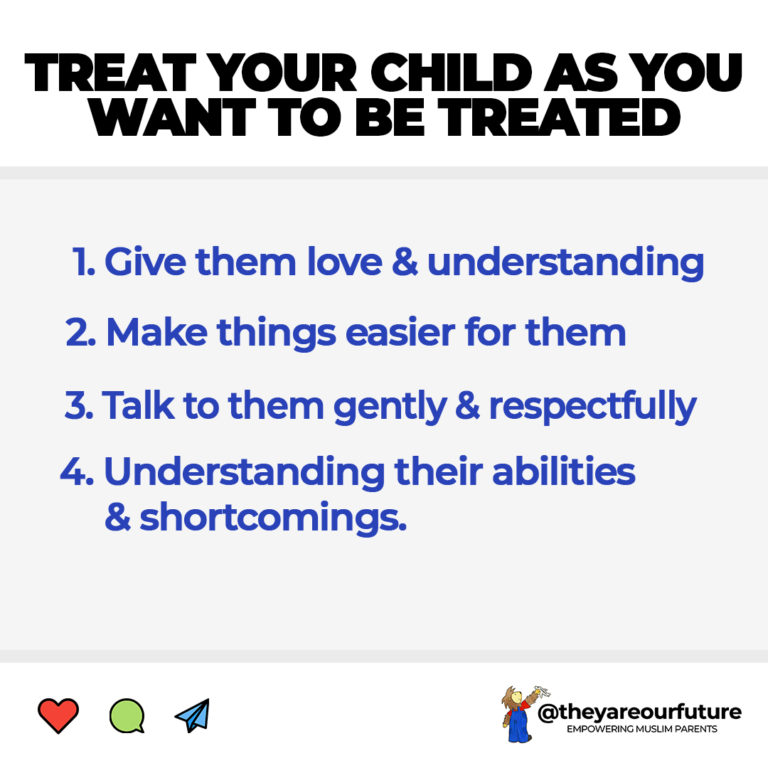
Does figuring out how to get your kids to listen to you, ever feel like trying to draw blood from a stone?
If our kids just listened to us things would be a whole lot easier for them and for us. We want our kids to listen to us because we know, or at least want, what’s best for them. We’d rather they learn from our experiences, than finding out the hard way.
And they should, right? We are their parents after all and Islamically, listening to your parents is an obligation. You don’t want your kids ignoring you and becoming parent deaf. You don’t want them to grow up ungrateful, selfish, disrespectful and disobedient…

You want your kids to listen to what you say, because:
- you don’t want them to get hurt,
- you want them to learn to look after their things, tidy up,
- you dont want them to get into fights, trouble or arguments.
You want your kids to listen to you so that they don’t hurt anyone else, get mad or shout, tantrum or cry.
You want your kids to listen to you so that they:
- eat their meals without a struggle,
- drink enough water,
- binge on less junk,
- sit for less time glued to a screenand of
- course get their school work done.
How to Get Your Kids to Listen – without yelling, screaming, shouting or tears

Getting your kids to listen to you is not impossible. And honestly, it’s not that difficult either.
You just need to be willing and determined enough to implement what you learn, and you need a better reason for your kids to listen, than ‘because they should’.
Ask yourself honestly why you want your kids to listen. Is it just so that their behaviour improves? So that things are easier?
As Muslims, our ultimate goal is to ‘listen’ to Allah ﷻ. Therefore, our ultimate intention as Muslim parents when wanting our children to listen to us, should be that they in turn, listen to Allah as well.
Because let’s not forget why we’re here in the first place; why we have children and what we should be working towards.
It’s normal to get held up in the waves of day to day life;
parenting might be the most important job you’ll ever do but it’s not the easiest that’s for sure.
But checking your intention before you do anything is not only one of the most fundamental principles of our deen but it also makes whatever we are trying to achieve more successful. Bear this in mind as you read on.
How to Get Your Kids to Listen – build a relationship which makes children want to listen

Before we get stuck into a list of tools you can instantly implement when trying to get your kids to listen to you, remember the goal of parenting is not to just have obedient kids that never take a step out of place.
Children are humans, trainee adults to be precise. They are not robots and they will never be perfect.
You have to expect and accept from the day your child is born, that they will make mistakes. They will mess up, disobey, overstep their limits, get angry, lash out and ultimately ‘misbehave’.
There is no way out of that. There is no perfection, especially when raising little humans.
If you really want your kids to listen to you with ease and respect and without tears, power struggles and stress, you’re going to need to build a healthy, loving and connected relationship with them.

There are no two ways about it.
Forcing and controlling a child into obedience through withdrawal of love and issuing of punishments, may work in making some children submissive, obedient and ‘well-behaved’.
But it will also:
- make them resent you inside,
- destroy their self-confidence
- limit their ability to make good decisions on their own,
- ruin their mental health
- prevent them from successfully living as healthy and stable adults.
And for other children, the more strong-willed type, no number of punishments and harsh treatment will get them to behave.
Allah made these children with buckets full of will power, an uncontrollable inner-sense of justice and strong self-belief to just accept such mistreatment, leaving your own mental health and everyone’s daily lives a misery.
With these two crucial points in mind; the intention to nurture your children so that they will obey Allah and in order to build a healthy and loving relationship with them, please read on and learn 6 tools that will get your kids to listen to you, finally!
How to Get your kids to listen
Click to Navigate this post:
1. Connection

Emotional and physical connection builds love and understanding between you and your child. It makes you consider their point of view and needs when deciding what you want them to listen to you about. When your child feels understood they feel connected. And when they feel connected, they trust you to take care of their needs and so, are more willing to cooperate with you. I.e. your child will be more willing to listen to you.
My 13-year-old hates the monotony of chores. He would rather bury his head in a book at any given second than think about completing his designated responsibilities. I used to think he was extremely ungrateful to take everything he wanted without feeling like he should give something back in return. I worried that he would become such a selfish and undisciplined adult. And that we’d have an awful relationship because of it.
But today I see a young human who was entrusted to me to train, nurture and teach in order to equip him with all the tools, knowledge and skills he would need in life. It requires a great amount of emotional intelligence, or emotional intuition – a natural instinct all mothers have but one which was buried so deep over the years as we learned that success and ambition was only monetary and material.
Your child needs to learn how to listen

This young human of mine needs to learn how to be grateful and self-disciplined. He does not necessarily recognise the feelings himself, or at least enough to act on them like a mature and responsible adult. Because he isn’t one of course.
And to teach him these principles of life I first use my innate ability (and need) to emotionally and physically connect with him.
The recycling tubs lying outside our back door were getting spilling all over the floor yesterday. Taking it our to the front bins was his responsibility. With my cup full, I can see how tedious a job it is for him, even with a day full of playing the computer game he thoroughly enjoys (and once campaigned for), connecting with his school friends online and generally just doing as he pleases!
I went to him and looked him softly in the eyes, one hand gently on his back and I smiled. “You’ve had a nice day haven’t you?” we got into a little conversation and then I pointed to the tubs. “They need doing, get them done before dinner please, it will be ready soon.” I gave him a loving squeeze and turned to continue with my own chores and sure enough, he turned to his.
That’s what emotional and physical connection looks like.
And I don’t just do it when I want my kids to listen.
Don’t just connect before you direct

Connection is what great relationships are made of, especially with children. Make sure you’re going to them, giving them a hug, a high five or kiss even before they come to you for it. And even if you’re not the touchy-feely type. A few years ago I would winch at the thought of having to give my kids bedtime kisses every night. It’s been a journey, but emotionally and physically connecting with my children to express love, has been transformational in how they respond and cooperate with me.
Connection is vital and crucial in raising healthy and stable Muslim children.
2. Communication

How you talk to your kids matters. Communication doesn’t just mean words you use, it includes your body language and tone of voice too.
You do not want to be reeling out instructions more than you have genuine conversations with your child. If commands and instructions are all your child is used to hearing, they’re going to quickly feel like you only talk to them when you need or want something from them, and so they just as quickly, become parent-deaf.
Build Genuine Conversation

Focus on building your relationship and genuine conversation with your child before thinking about how to just get them to listen to you.
Spend time with them in their world. Play their games, read their books, listen to their thoughts and ideas. If you find they don’t talk much, you may have inadvertently trained them to not only keep their thoughts to themselves but also not know much about what they like or dislike because you may have always chosen for them. Ask them questions and listen as patiently as you can. Don’t try to finish their sentences or assume you know what they’re thinking or going to say. Don’t cloud any conversation with yourself, by being autobiographical (this is not the time), make it about them and make it enjoyable. If your child enjoys talking to you and hearing your voice in conversation, and if they feel heard, understood and listened to, they will be far more likely to want to listen to you.
Soften your tone and face

Life makes us all sorts of stressed and frustrated and it’s all too easy to carry those burdens with us every hour and minute of our day. But as Muslim mothers, we must remember that our children are around us every day too, and they are sponges, absorbing everything, even your silent facial expressions.
Many of us go about each day carrying an ingrained stone-face (aka resting b**** face). Put yourself in your child’s shoes and imagine what that must feel like? What must they think? That mummy is annoyed and upset every day? That something is bothering mummy, that mummy is not happy. “Maybe it’s me? She smiles when she’s on the phone, she laughs with her friends. Maybe mummy doesn’t like being at home with me…”
With this sad reality in mind, turn up the sides of your mouth as much as possible when around your children. I.e. smile at them. Be conscious and self-aware of you facial expression. Lift your eyebrows slightly, and your shoulders too. Even if you don’t feel like it. Because as Muslim mothers, when we take ownership of our God-given and beautiful role of motherhood, the healthy nurturing of our children comes first. And you will be surprised to find, that forcing yourself to smile and show happiness, even when you don’t feel like it, will actually have the same affect as actually being happy. Your body will sense you smiling and release the appropriate hormones that will elevate your mood. Try it consistently over some time and then come back to me. I’d love to know if this worked for you.
Improve your body language

Get out of the habit of uttering commands to get into pyjamas whilst you scroll through your phone or wash the dishes.
If you want your kids to listen when you are speaking to them:
- Give them your eyes
- Turn your body towards them
- Get down to their level
- Place a hand on their shoulder or run your fingers through their hair
Better yet, do this when they are speaking to you too!
What to say

There are some handy ways of speaking that will make it easier for your child to listen.
- “I need you to …”
- “When you’ve done … then you can …”
- Describe what you see “your wet towel is on the floor” “your plate belongs in the sink”
- Say it in a word “towel!” “plate!”
- Write it in on paper “Dear children, I’m working out in here, get washed and dressed and meet me in the kitchen at 9am, love Mum xxx”
- Reaffirm your expectations “Dawud, when I tell you do something, I expect you to listen” “We tidy up one game before starting another”
3. Motivation

In any given day there is just so much for us mothers to expect of our children. Their morning and bed time routines, finishing their meals, tidying up after themselves, completing their school work, playing nicely with each other etc. etc. etc.
It is impossible to not issue any commands completely and it is not irrational or unfair to expect your children to listen to you when you do ask them to do something.
But your children are humans not robots, and they’re in-training to be precise, so we’re going to need to help them to learn to do those everyday life things, by giving them a bit of motivation.
You can motivate your child before or after the tasks you want them to do, it’s entirely up to you. But don’t use all the fun things as rewards. Make sure their days are filled with fun and joy, because they are children. And when they feel happy and good, they will behave happy and good.
5 ways to motivate your children:
Special time
Have it in your mind that you will spend a little bit of time connecting with your child(ren) one-to-one every day. Of course, if you have one child this is much easier than if you have multiple. But do it, even if it’s for a few minutes in between cooking and cleaning to have a connected one-on-one conversation.
Aside from this regular special time, plan in larger chunks of time to spend with your child(ren). For example, my 11 year old daughter and I have a shopping trip planned, my 13 year old son spent most of Saturday morning playing scrabble and my 9 year old looks forward to drawing with me.
If each child knows they will get their turn, with reassurance and empathy when it’s not their turn, this healthy habit will soon become easier to implement inshaAllah.
Screen time
I use this motivator as something to look forward to after school work. My children know, that ‘when the learning and living rooms are tidied, then they can get their screen time’. We have a rough time frame in the afternoon for screen time and pre-decided boundaries and rules about what they can and cant watch/play, for how long and on which days. My children were heavily involved with and their opinions taken into account when making and establishing the rules, and so should yours be. After all, this is regarding them and how they spend their time! Treat them respectfully so that they not only feel loved, but valued and important too.
Jokes and humour
This work especially with older children. Treating them as though they are your friends increases your child’s self-esteem and confidence. Whilst we clear the dishwasher or set the table, I love to have a laugh with them. We talk in accents, tell jokes and get into funny role plays. The beauty of children is that you don’t need to care about how you look or sound. They love you unconditionally, and it doesn’t matter if you sing terribly, or are the worse at accents, they’ll adore you for being you. Don’t worry, lighten up and step outside your comfort zone if you have to. Your children are the safest people to do so with.
Choice

Do not expect your toddlers to always listen you and do not insist on it either. At this age, it does not matter how connected you are, many toddlers and pre-schoolers can get so caught up in their feelings, thoughts, plans and desires that they just cannot listen to what you want over what they want.
Instead give them and all your children, as much choice possible.
Alternatives

Help your kids to listen to you if you cant say yes to something they wants, by offering them a decent alternative. For example, if my toddler wants icecream now but it’s a cold day, I’ll tell him I know he loves icecream, but its too cold for it, he can have it when its sunny and instead have a yogurt/fruit/crisps etc now (whatever works for you). Similarly with my 13-year-old, when he wanted to get social media to talk to his friends online, I spoke to him about how I understood what he needed but wasn’t comfortable with unhealthy affects of social media. I then allowed him an alternative; to play computer games online with his friends instead, on a specific website that we were both was comfortable and happy with.
Transitions

This tool works wonders when trying to get younger and more strong-willed children to listen. These little rascals hate anything suddenly being thrust upon them. To avoid power struggles and tantrums over simple things like getting into their cot, start a simple commentary of your day and what your child can expect.
For example, before putting my toilet-training, 2-year-old to bed, I will say to him, “Tomorrow, we’re going to wake up and put big boy pants on, brush our teeth and have breakfast together. What colour pants do you want to wear?”
Or before bedtime (he hates going to bed alone) I will say, “after dinner, we’ll read a story, get into pyjamas and have cuddles before you get into your cot to sleep ok?” I wont expect a reply. Knowing he’s heard, beforehand, will make it easier to gain his cooperation at the time. Try this over a few days and weeks and please let me know how it goes.
Final Thoughts

At the end of the day, getting your kids to listen to you simply requires that you treat them as little humans. Give them love and understanding, make things easier for them and talk to them in gentle and respectful ways, all whilst understanding their age-dependent abilities and shortcomings.
The goal of wanting your kids to listen to you isn’t and shouldn’t be obedience and good behaviour. The goal is raising healthy, stable and successful children as members of supportive and interdependent families and communities.
And remember, the ultimate goal when wanting our children to listen to us, should be that they become adults (including teenagers) who listen to (obey) Allah.
Let’s Grow Together
I’m coaching and empowering an intimate group of ladies in my private group – Mothers of the Future.
Join Us
Get access to the group and the Mothers of the Future Audio Library.
Listen and re-listen to over 9+ hours (and building)of empowering audio teachings and trainings, created especially for struggling MUSLIM mothers seeking consistent change, once and for all.
No ads. No apps. Just deen-centered, in-depth, distraction-free guidance & support, you can trust.
Was this helpful?
Leave a comment below to let me know your thoughts, or feel free to ask questions.
Make sure you’re following me on Instagram @theyareourfuture for more parenting tips and resources.




![How to get your kids to listen [Muslim Parenting]](https://usercontent.one/wp/www.theyareourfuture.com/wp-content/uploads/2020/08/3537116-768x481.jpg)
![How to get your kids to listen [Muslim Parenting]](https://usercontent.one/wp/www.theyareourfuture.com/wp-content/uploads/2020/08/290086-P6O5T1-983-768x512.jpg)
![How to get your kids to listen [Muslim Parenting]](https://usercontent.one/wp/www.theyareourfuture.com/wp-content/uploads/2020/08/272662-P5IYON-542-768x512.jpg)
![How to get your kids to listen [Muslim Parenting]](https://usercontent.one/wp/www.theyareourfuture.com/wp-content/uploads/2020/08/1272-768x512.jpg)
![[Muslim Parenting]](https://usercontent.one/wp/www.theyareourfuture.com/wp-content/uploads/2020/08/OPFJ4X0-768x512.jpg)

![[Muslim Parenting]](https://usercontent.one/wp/www.theyareourfuture.com/wp-content/uploads/2020/08/292574-P6RIIZ-698-768x512.jpg)